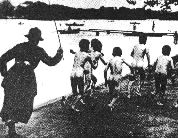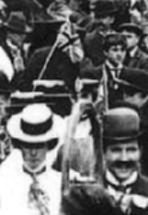
Wayward ways; moral order
Class acts
Seeing lives through the lens
of "fashionable eyewear we don't
even know we're wearing"
|
Mind your manners!
Sites of class control, featured in three pieces here on preview |

Urban amenities;
erotic anxieties

Mad for "the show"

Not at liberty
Most of the Queen Street stories I put up for preview in April 2002 reflected a theme I'd not much pondered when I first set out. They touched on an issue not an "issue" to many minds, in most American minds an absolute non-issue, formally invisible: class. Here are excerpts, sightly revised, from that preview's introduction.
Class? Oh no (I can hear it): He's not going to get tiresome, is he? Another grim, guilt-tripping leftie? No (or not much). I have no use for guilt. And I have often found sober formula thin cover for sloppy thought.
Self-confessed Leftists (a species lately thin on the ground) are less apt to go on about class than race, gender, sexual orientation -- social conflict seen through the lens of victimized "identities," rich in resentment, grim complaint, fodder for liberal guilt. Even progressives can fail to see the power at play beneath the bounds of identity, and at work within each one: money, status, education, presumption of one's place in the world. All that, fundamentally, is about class.
Not so much, these days, in the pure Marxist sense of one's "relation to the means of production," the control of "capital accumulation" (real power now rests in control of the means of consumption), but as a state of mind nearly unconscious.
Philosopher Roland Barthes once spoke of "tracking down, in the decorative display of what goes without saying, the ideological abuse which is hidden there." He was talking about the sort of presumption most of us take for granted: so total it seems merely "natural," a lens invisible -- fashionable eyewear we don't even know we're wearing.
All along Queen Street, past and present, I found myself running into such presumption, an arrogance at once massive and innocent: good people of logical mind, social commitment, progressive intent, often professional -- the "expert classes" -- using "others less fortunate" as fodder for the advancement of their brilliant careers.
Doctors, social workers, peace officers, urban planners: the "helping professions." Nearly all did, genuinely, want to help. Sometimes they did. But they rarely inquired of those on whom they bestowed their good offices what sort of help -- if any -- they wanted, what means the "helpless" might find to shape the world on their own.
They never had to. They were experts: they knew best. Whatever they did, they assured those they did it to, was "for your own good." So give in, be good; be thankful for my kindness, my generosity, my credentialed and respected expertise.
They also worked to guard their good works' historic legacy. It wasn't hard: they, or people like them, were the ones who got to write "history" -- "tales of dead white men" we're told in the lingo of identity politics, "dead white straight men" if we want to be "inclusive."
But missing from that list of adjectives is one equally telling -- not just about the tales but their tellers: a term to mark those historians' class position, the particular place from which they saw the world. (But of course: that goes without saying....)
We might say "professional." "Privileged" perhaps, or "educated." But any of us may be educated -- and the liberty to reflect on life is a privilege of the best sort. So, maybe "middle class," or better.
But in "respectable" histories -- whoever writes them -- it's middle class manners that must be minded. Power, conflict (except as ennobled by war), social discord, class struggle: all that is in such poor taste. And really, why go on about it? We've learned to be nice now, haven't we?
Nice people (and gentrifying neighbourhoods) ever prefer "heritage" to real and messy history. Heritage is cute; history bites. They like reality mediated: selected, processed, neatly packaged; virtual, not physical; imaginary, not embodied. Real bodies in the real world are "inconvenient," perhaps "inappropriate" (a favourite word of social workers).
And annoyingly hard to control.
The stories here reflect these themes, if also one vitally related: resistance -- often conscious, collective, formally organized. But social change is not always about dauntingly Big Causes. It also grows from acts personal, communal, ordinary -- what I have come to call (watching people move in the world) "everyday acts of being."
Simply living as one wants, trusting one's own perceptions and power, can be an act of resistance. We make the world, or our part of it, every day.
That power to act may be claimed by "right" -- though that's often a long and costly route. It's easier (and more fun) to claim power in the same way those more powerful do: by presumption. If, unlike theirs, conscious presumption, attentive, even risky. Don't beg permission; they don't. Just do it. Test the limits.
It may well prod the powers that be to declare those limits, usually hidden, and the force they are willing to deploy -- most often by proxy: sending out others also less than fortunate, unleashed on bully-boy orders -- to defend their presumption of power.
But then the cards are on the table, the decorative "veil of ideology" torn away. All of us, then, get to see the real world. And see what power we have, together, to make it the world we want, all of us its citizens.
Go on to:
Urban amenities; erotic anxieties
Baths, lavatories, & the YMCA: The politics of bodies in civic space
Go back to:
Passing stories
Queen Street Preview / Introduction
Or to: My home page
This page: http://www.rbebout.com/queen/2pclass.htm
April 2002 / Last revised: September 9, 2002
Rick Bébout © 2002 / rick@rbebout.com